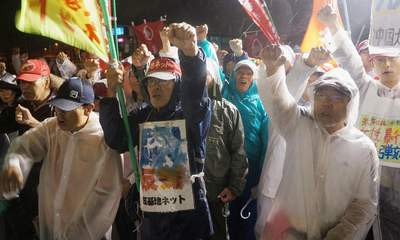Japan Rape: US Soldiers Jailed In Okinawa

Two US sailors who raped a Japanese woman in the street in Okinawa last October have been jailed for nine and 10 years.
Christopher Browning, 24, and Skyler Dozierwalker, 23, were sentenced at the Naha District Court in Okinawa.
Browning and Dozierwalker, who were not stationed in Okinawa, had been drinking on the evening of the attack, which left the unidentified woman with neck injuries.
Browning also stole 7,000 yen (\$75) from the victim, according to prosecutors.
Judge Hideyuki Suzuki described the pair as "contemptible and violent" as he sentenced them.
"The ruling may seem severe, but the damage to the feelings of the victim and residents is more severe," he said, according to Kyodo News.
During an earlier court appearance, the two men had admitted the offence, which caused outrage on the sub-tropical islands and beyond, and led to a nationwide night-time curfew on all US military personnel in Japan.
Despite the curfew, misconduct involving US servicemen, much of it drunken, has continued to fuel anti-US sentiment in communities with bases.
Wary of yet another public relations disaster, the US had moved quickly to ease concerns in the immediate aftermath of the rape, with ambassador John Roos holding a news conference at which he appeared visibly angry and upset.
"I understand the anger that many people feel with respect to this reported incident. I have a 25-year-old daughter myself, so this is very personal to me," he said.
Okinawa is reluctant host to more than half of the 47,000 American service personnel in Japan, and the crimes, noise and risk of accidents associated with their bases regularly provoke ire in the local community.
Although most crimes committed by US military personnel in Japan are handled by military courts, they can be prosecuted in Japanese courts in cases that occur off base and are deemed to be particularly serious, such as murder and rape.
Browning and Dozierwalker will serve their sentences in a Japanese prison.
In 1995, the gang rape of a 12-year-old Okinawan girl by US servicemen sparked mass protests resulting in a US-Japan agreement to reduce the huge military presence on the island.
Okinawans say other parts of Japan should take more of the burden and want bases closed or reduced in size.
But with islands stretching out from mainland Japan to Taiwan that obscure rising China's access to the Pacific, Okinawa is too strategically important for either Washington or Tokyo to be able to countenance a large-scale withdrawal.

 Yahoo News
Yahoo News 